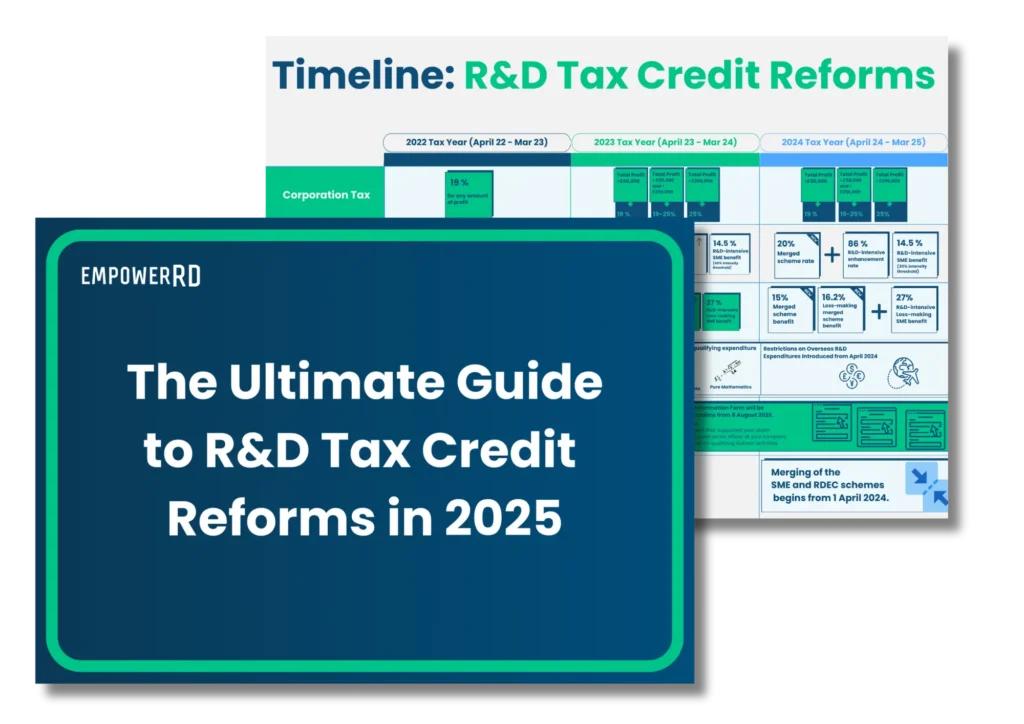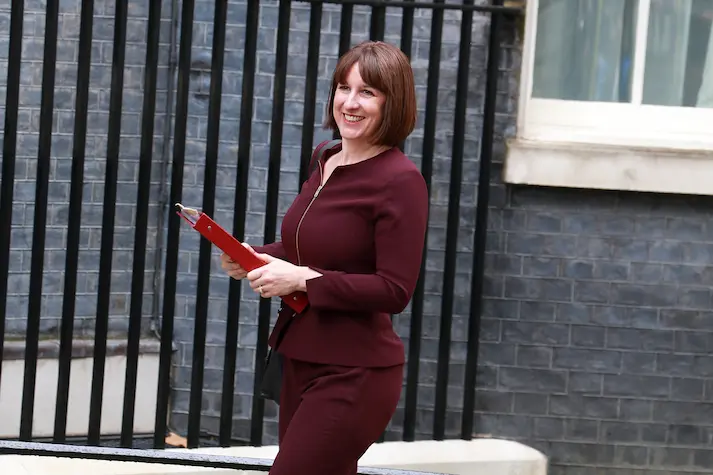
Welcome to our new “Meet the Experts” series, where we introduce the R&D experts at EmpowerRD who assist 1,000s of innovative companies to submit compliant and optimised R&D claims.
In this edition, we talk with Dr Matthew Rix, who holds a PhD in synthetic organic chemistry and who now excels as an R&D tax consultant and technical report writer.
Matthew shared his journey from academia to the R&D tax relief world. He received his PhD for his work on synthesising sulfur-containing monomers called thionolactones and developing novel biodegradable materials. He then moved to the pharmaceutical industry, focusing on synthesising active pharmaceutical ingredients (APIs) and medicinal compounds. Now, he ensures technical reports meet HMRC’s rigorous standards. He also shares how his chemistry background allows him to communicate effectively with clients from various industries.
Let’s dive into Matthew’s experiences and insights!
Hi Matthew. First off, could you tell us a bit about your role as an R&D tax consultant and technical report writer at EmpowerRD?
Hi, and thanks for having me! As an R&D tax consultant and technical report writer, my job is to guide clients through the report-writing process, ensuring we submit claims that are robust, accurate and compliant with HMRC’s guidelines.
I work closely with clients to understand their R&D projects and help them articulate these activities for their claims; this involves technical interviews, cost apportionment analysis, and document reviews to make sure everything is in order before submission.
“As an R&D tax consultant and technical report writer, my job is to guide clients through the report-writing process, ensuring we submit claims that are robust, accurate, and compliant with HMRC’s guidelines.”
What brought you to EmpowerRD, and what excites you about working here?
Having worked in R&D tax for nearly two years, I’ve come to recognise that submitting R&D claims manually can be time-consuming, inefficient, and prone to errors. What really attracted me to EmpowerRD was the fact that they had their own innovative platform that would automate certain tasks and streamline the process; this helps me focus on providing better support for our clients.
What excites me most about working here is the collaborative environment. There’s always cross-team cooperation, allowing me to gain insights beyond my own area, including client outreach and software development. It’s really nice to have a broad understanding of the business as a whole.
“What really attracted me to EmpowerRD was their innovative platform that automates certain tasks and streamlines the process. This not only simplifies claiming for clients but also enables our R&D experts to offer more effective support.”
What does an R&D Technical Report writer do daily?
Much like the R&D process itself, writing technical reports is an iterative and collaborative task. It involves many different versions and frequent communication with clients to ensure the final submission is as high quality as possible before being submitted to HMRC; for example, I will typically leave written feedback for the client to address or conduct technical interviews where we discuss the project in further detail.
While the main focus of my role is guiding and drafting R&D project write-ups, I’m also involved in the submission process, cost apportionment analysis, document review, and financial validation. For example, with cost apportionment analysis, we review how clients apportion R&D expenditure and ensure that these apportionments are accurate and fully compliant with HMRC’s guidelines.
Document review is another critical part of my role. I assess a company’s funding sources (e.g. Innovate UK) to determine how it affects the way we claim. I also examine worker contracts to establish if they are subcontractors or externally provided workers (EPWs) for R&D tax purposes.
How did your PhD research inspire your interest in the R&D tax credit field?
When I was writing my thesis, I really enjoyed writing about and reviewing other people’s works; I think this inspired me to write reports for R&D tax claims. There is something satisfying about making complex R&D clear and concise.
How has your background in synthetic organic chemistry helped you in the R&D tax credit sector?
Chemistry is such a wide field and can be applied in everything from car engine lubricants to food science. For example, when a baker talks about pliability and the need for the bread to achieve a specific texture and flavour, I know as a chemist what they are really talking about is the rheological properties of a mixture and its organoleptic characteristics.
When engaging with clients in the pharmaceuticals, petrochemical, and agricultural sectors, I believe that my background in chemistry enables me to communicate effectively with the client’s competent professionals on an equal footing. My background enables me to better understand the scientific principles and methodologies our clients are employing, whether it involves developing a new pesticide, plastic material, or medical compound.
What are some of the key factors you consider when determining whether a project qualifies for R&D tax relief?
The way I see it, the R&D tax incentive scheme is a self-assessment scheme and has three main criteria:
- Does this individual or group meet HMRC’s definition of a competent professional?
- Have scientific and/or technological means been used to try and resolve scientific and technological challenges? Also, is the project in a claimable area? (i.e. economics, the arts, and humanities are all non-qualifying).
- Is the answer/solution these competent professionals are seeking not readily deducible based on publicly available knowledge? Also, could the answer/solution be readily adapted using existing technologies?
How do you ensure that complex scientific innovations are communicated effectively to HMRC when writing technical reports?
During my PhD, I often explained specialised research to people outside my field by breaking it down into simpler concepts;his approach is also essential when writing R&D reports for HMRC. Since HMRC receives reports from various industries, clarity is key for effective communication.
At the beginning of a claim, I focus on explaining the technology’s function and purpose in clear, straightforward terms. If needed, I describe the key components to provide HMRC with a better understanding of the project.
As the report develops, I gradually introduce more detail, building on the initial concepts. This ensures the report is easy to follow while detailed enough for a competent professional to appreciate the innovation.
What are some of the common mistakes you see in technical drafts provided by clients?
I’ll focus on two mistakes that I see the most:
- Potential claimants of R&D tax credits often present both commercial and technical aspects of a project as R&D. However, only the technical elements of a project should be presented. Separating these two aspects can be challenging for clients, but it’s crucial to focus solely on the scientific or technological challenges and advancements. To learn more about the difference between an R&D project and a commercial project, read our latest blog.
- Always show rather than tell. I always come across instances where a client has stated that the R&D was “very iterative and involved lots of testing” but this fails to convey to HMRC why and how the R&D activities were iterative. Talking about different versions, the failures and successes along the way, and changes made shows that process.
“As an R&D tax consultant and technical report writer, my job is to guide clients through the report-writing process, ensuring we submit claims that are robust, accurate, and compliant with HMRC’s guidelines.”
What do you find most rewarding about helping companies secure R&D tax credits?
I really enjoy peeking behind the R&D curtain. It’s fascinating to discover what companies are developing and what technologies will emerge in the future. The best part is seeing how R&D projects evolve over time. You can follow their progress for years and witness how the technology develops before eventually becoming public.
What advice would you give a business thinking about claiming R&D Tax Credits in 2024?
If I were a first-time claimant, I would ask three main questions to prospective R&D tax consultancies:
My advice would be to ask three key questions when choosing an R&D tax consultancy:
- What will it cost?
- What’s their success rate?
- What is my role as the claimant?
These questions help ensure you choose a partner who will guide you through the process effectively and optimise the benefit of your claim.
What do you enjoy doing in your spare time? Do you have any hobbies or interests outside of work?
In my spare time, I enjoy going on countryside walks. I’m also an avid painter of miniature figures, particularly Warhammer, and have recently begun experimenting with an airbrush. Additionally, I love listening to audiobooks; I particularly enjoy Isaac Asimov’s Foundation series and Stephen Fry’s Mythos trilogy. Swimming is another activity I enjoy; whether that be exercising in pools or snorkelling in the Mediterranean.












